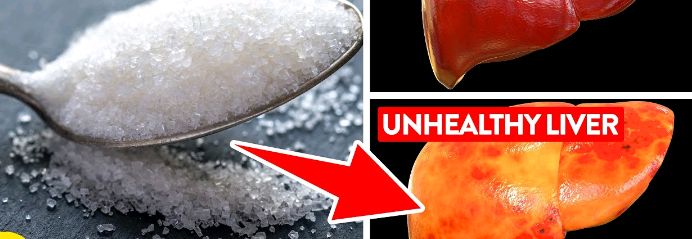What Sugar Does to Your Liver
The more you consume sugar, the more your liver cells get replaced by fat, leading to non-alcoholic fatty liver disease. When the liver becomes fatty, it cannot perform its function as a healthy liver.
- Advertisement -
What sugar does to your liver : Consuming excess sugar is not good for our overall health. It has a negative effect on the body organs. The effect becomes worse when it affects the vital organs.
Too much sugar can affect all the vital organs, but a lot of attention is being put to the effect sugar has on the heart and the kidneys.
- Advertisement -
Excessive sugar has a negative effect on the liver as well, but less attention is paid to the effect it has on the liver.
- Advertisement -
Consuming excess sugar can badly harm your liver. The only organ that can process sugar in the body is the liver. Hence, consuming excess sugar puts pressure on your liver just as alcohol consumption does to the liver. So don’t think that you are not drinking alcohol in excess, so you aren’t causing any damage to your liver. Consuming excess sugar also damages your liver.
The liver is the largest internal organ, and it’s located in the right upper quadrant of the abdomen just beneath the rib cage. The liver contains millions of cells which enable it to perform its functions. Due to it, numerous cells and damage to the liver does not manifest on time. Before you begin to have any signs or symptoms of liver damage, it means most of the cells have been damaged. Also, the liver has no nerve endings, so you do not feel pain in your liver to alert you to take a step. That is why you need to take good care of it to avoid causing damage to it.
Effect of sugar on liver
- Advertisement -
As said earlier, the only organ in the body that processes sugar is the liver. After you eat, the body converts the carbohydrate or sugar into glucose. The body uses some of the glucose as its source of energy immediately and stores the rest as fat in the liver. So, when you consume sugar in excess, the glucose in your body also increases and after your body uses some for energy, the rest will be converted into fat and will be stored in your liver. When the fat accumulates in the liver over time, the liver cells get replaced by fat. The more you consume sugar, the more your liver cells get replaced by fat, leading to non-alcoholic fatty liver disease. When the liver becomes fatty, it cannot perform its function as a healthy liver.
Also, consuming excess sugar triggers the body to release inflammatory chemicals. These inflammatory chemicals also damage the liver and other body organs. When the liver is unable to burn excess fat and cholesterol, it causes accumulation of fat in the body which increases your risk of developing heart disease, high blood pressure, obesity, diabetes and kidney disease.
According to the American Heart Association, most women are to consume no more than 6 teaspoons of sugar per day and most men are to consume no more than 9 tablespoons of sugar per day. These figures are for non-diabetic people. If you are diabetic, make sure you talk to your dietitian before consuming sugar.
The liver has so many functions in the body. It burns excess fat and cholesterol, and removes poisonous substances from the body. Aiding in digestion, Regulating the body’s glucose levels, Removing waste products from the body and many more.
Minimize your sugar intake and take good care of your liver.
Source: ausmayservices
- Advertisement -


